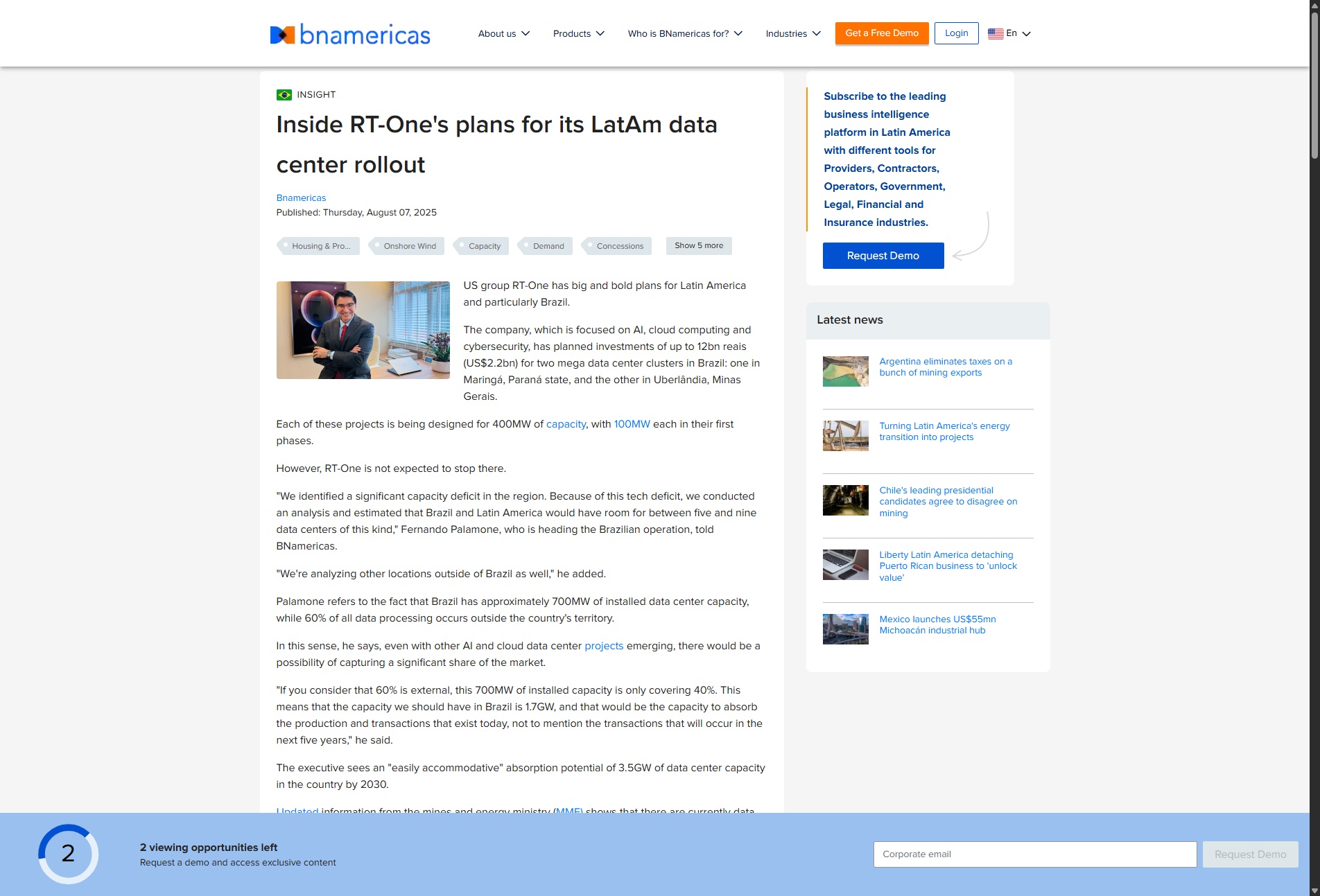US group RT-One has big and bold plans for Latin America and particularly Brazil.
The company, which is focused on AI, cloud computing and cybersecurity, has planned investments of up to 12bn reais (US$2.2bn) for two mega data center clusters in Brazil: one in Maringá, Paraná state, and the other in Uberlândia, Minas Gerais.
Each of these projects is being designed for 400MW of capacity, with 100MW each in their first phases.
However, RT-One is not expected to stop there.
"We identified a significant capacity deficit in the region. Because of this tech deficit, we conducted an analysis and estimated that Brazil and Latin America would have room for between five and nine data centers of this kind," Fernando Palamone, who is heading the Brazilian operation, told BNamericas.
"We're analyzing other locations outside of Brazil as well," he added.
Palamone refers to the fact that Brazil has approximately 700MW of installed data center capacity, while 60% of all data processing occurs outside the country's territory.
In this sense, he says, even with other AI and cloud data center projects emerging, there would be a possibility of capturing a significant share of the market.
"If you consider that 60% is external, this 700MW of installed capacity is only covering 40%. This means that the capacity we should have in Brazil is 1.7GW, and that would be the capacity to absorb the production and transactions that exist today, not to mention the transactions that will occur in the next five years," he said.
The executive sees an "easily accommodative" absorption potential of 3.5GW of data center capacity in the country by 2030.
Updated information from the mines and energy ministry (MME) shows that there are currently data center grid connection requests totaling capacity of more than 13GW by 2030.
However, many of these requests are unlikely to materialize, partly because most tend to compete for the same tech company clients that will utilize the capacity, and partly because even those with firm customer demand may not actually have leases signed due to changes in market dynamics.
'Speculative' projects
Palamone says there is a lot of speculation surrounding many of the data center connection projects. He denies that RT-One is itself making announcements that are not anchored to demand.
"Many of these requests are speculative. There is no real plan behind them. This is a problem Brazil faces today. We're not speculative."
The executive claims that RT-One has demand for its initiatives in Brazil and a structured project to move forward with what is being planned.
He added that "because Brazil is being regarded negatively," projects in the country need to be even more thoroughly planned. In the company's view, that means having at least 70% of each project module anchored by contracts before construction begins.
RT-One does not meet that 70% target, admits the executive, who says the company is still working to get there.
The firm has structured its projects so that each of these modules, which are not to be confused with a first phase of 100MW, can be implemented within 12 months.
Once it begins construction, it will take about a year to receive the equipment and open for operation, according to Palamone's projections. While construction is underway, and depending on demand, deployment of another modular part of the data center can begin.
"This way, we can build more things in parallel," Palamone said.
Each of the locations, Maringá and Uberlândia, has at least 10 modules within the planning carried out by RT-One.
The projects in Brazil are "twins" and part of two other projects that have the same characteristics and which are being developed in the US state of Oregon and soon in India.
Locations and permits
The Brazilian locations were chosen based on a combination of surplus energy on the grid, good connectivity and a good workforce, said Palamone.
Maringá is also in an export processing zone (ZPE), which should entitle the company to tax incentives for exporting data from these zones. Palamone says he sees no contradiction between this and the fact that little data is processed in Brazil.
Clean energy, particularly good hydro power and the water recirculation and reuse systems, were also considered. According to the executive, the projects in Brazil will have closed water circuits to ensure reuse.
As for power, RT-One is targeting a power usage effectiveness (PUE) of 1.1 for the sites, which would be one of the lowest in the country for data centers.
Despite the project announcements, the company has not yet filed requests to connect the sites to the grid. RT-One, Palamone said, has agreements in force with power distributors Cemig (Minas Gerais) and Copel (Paraná) for the initial loads of the projects.
The utilities can supply up to 100MW in capacity, but beyond that, it is necessary to go to grid operator ONS for authorization for basic connection, he added.
"First, we obtain local access, which is guaranteed. We have 100MW guaranteed in each of these locations. And the process follows the internal procedures that already exist between the local concessionaire and the ONS," he said.
In Maringá, the project is more advanced, and the company is currently obtaining the construction permits from the municipal government.
At the same time, RT-One's leading Brazilian construction partner, LZA Engenharia, is issuing RFQs to contract other suppliers and providers.
RT-One's strategy is to assemble a pool of diverse, competing suppliers for the projects to avoid dependency and ensure diversification and redundancy.
VNC
One of the leading partners in energy is Brazilian company VNC Energia.
The companies are collaborating on the construction of the data center, which will use renewable energy sources but also an innovative method for clean backup generation, according to the parties.
"We're committed to not doing more of the same, that is, we're committed to providing data centers with 100% clean, renewable energy. For this reason, we have developed a 100% eco-friendly generator," VNC's CEO Carlos Ficoni told BNamericas.
VNC's idea involves the use of aeronautical turbines, powered by a clean energy system, including clean energy converted from waste to ammonia, the executive said.
The company's design also implies that the generator can be powered by solar panels, but also generate energy for charging batteries while functioning, he said. With this, says Ficoni, the structure can even operate off-grid.
VNC is working with international suppliers and a Brazilian aeronautical engineering startup to develop the model.
The company is also an RT-One partner in water to help mitigate consumption for cooling, even with a closed circuit and reuse.
According to Ficoni, the estimated water consumption for the RT-One projects is high, at around 20 million liters per year. He says that all returned water will be properly treated and "remineralized."








